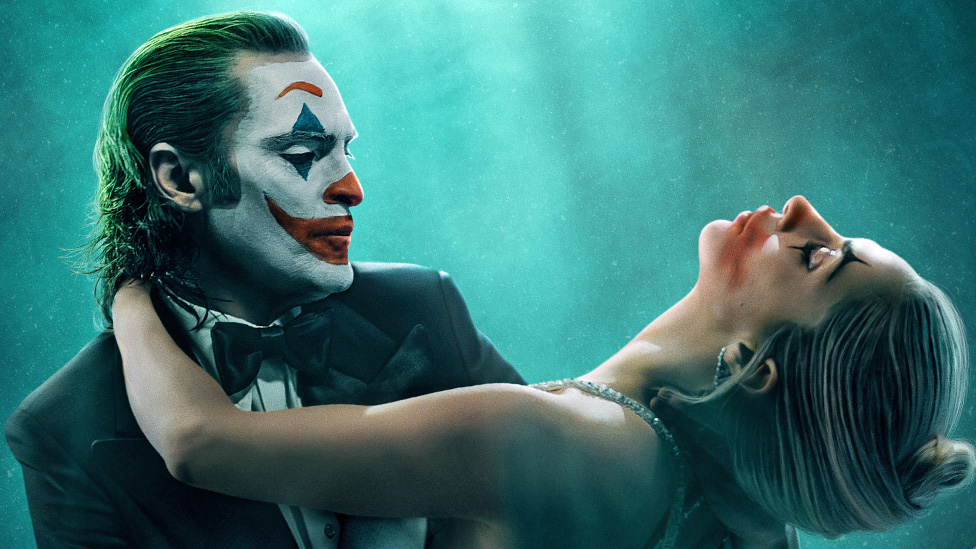Review | ‘Joker: Folie à Deux’ is a movie made for nobody


Despite the first film finding a core audience in incels, “Joker: Folie à Deux” refuses to commit to its status as a musical, comedy or cult film for misogynists — alienating every possible audience.
It cannot commit to anything thematically, narratively or stylistically, resulting in a dull courthouse drama awkwardly dressed up in tap shoes. Performances and standout cinematography cannot save this off-key disaster.
The world was taken by storm when “Joker” was released in 2019. If winning top prizes at the Venice Film Festival, over $1 billion at the box office and enough Joker Halloween costumes to bankroll green hair dye companies for the next century wasn’t enough, the film garnered a cult following among an echo chamber of inconsolable internet-dwellers.
Public and critical outcries labeled the film as a manifesto for red-pilled loners, and writer-director Todd Phillips expressed discomfort with the lasting impact of his film. While the problematic content of the first is undeniable and intentional, its reception was unexpected. With “Folie à Deux,” Phillips aimed to disavow the ideology of his zealots and pivot to find a new audience.
However, he only excels at making comedic movies for white dudes, as seen with two of his previous projects, the “Hangover” series and “War Dogs.” Without his bread-and-butter audience, Phillips flounders. “Joker” heavily draws upon — I’d say rips off — the Martin Scorsese films “Taxi Driver” and “The King of Comedy.” However, there’s nothing in Scorsese’s filmography for Phillips to riff off in this sequel, and his lack of creativity and critical reflection is even more apparent.
‘Joker: Folie à Deux’ picks up two years following the end of its predecessor. The titular character is imprisoned in Arkham Asylum for the murder of five people, including TV host Murray Franklin on live TV. Despite — or because of — these murders, he garners a cult following among the people of Gotham, especially following the TV movie depicting his rampage. Among these fans is fellow asylee, Lee Quinzel, played by Lady Gaga. In preparation for what is supposed to be “the trial of the century,” Arthur’s lawyer, played by Catherine Keener, is convinced that his dissociative identity, the Joker, is the real culprit.
While the plot description provided many avenues to provide commentary, or even simply entertain, the film fails to do both. In trying to address and critique the media sensationalism and gross idolization of serial killers — which it never does meaningfully anyway — it completely takes the viewer out of the main romance. It depicts a toxic relationship between Arthur and Lee, where she and, in turn, the rest of his fans, do not see the real him and only love the idea of the Joker. When the movie isn’t focused on crooked devotion, it follows the overly televised trial of Fleck v. the People of Gotham. Despite one-third of the movie occurring in a courtroom, every scene is slow, dull and forgettable. The traditional twists and intrigue of a courtroom drama come from slowly unraveling the crime, but since the audience was there when it happened, the setting feels wasted.
Although Phillips fails to use this locale to enhance the story, cinematographer Lawrence Sher takes advantage of the series status as a 1980s period piece and revels in it. His touch is evident in shots like the infamous staircase scene from the first film and all of the courtroom scenes in this one. His camerawork is beautiful and so engaging. His ability to enliven and vilify the grit and grime of Gotham is something many modern takes on DC’s most popular city lack, and it captures the essence of the films Phillips intended to imitate.
The cast is one of the only other major strengths of the film. The assistant district attorney Harvey Dent, played by Harry Lawtey in his first blockbuster role, excels during his limited screen time. Although the film is a major departure from the comic books, Lawtey would play a compelling Two-Face if “Joker: Third Time’s the Charm” is ever greenlit. Gaga, in only her sixth major production, continues to prove that she is one of the best multidisciplinary artists of her generation. Joaquin Phoenix reprises the role that won him Best Actor at the 2019 Oscars, and he fully commits to the unhinged depravity of Arthur Fleck. Well, that’s until he starts singing, of course.
I’ve gone this long without mentioning the musical aspect of the film because, while yes, it is just as bad as I expected, what’s worse is that the musical aspect doesn’t matter. Lady Gaga is obviously a musical powerhouse, and the companion album, “Harlequin,” demonstrates this, but she is being held back by the abysmal vocal performance by Phoenix. Despite the musical being his idea, his singing leaves a whole lot to be desired. In the nicest terms, it seems as if they recorded him singing in the shower without his knowledge. When paired next to a 13-time Grammy Award winner, it sounds like a rooster trying to harmonize with a harp.
However, the most insulting thing is that the audience was subjected to the musical struggles of Phoenix for seemingly no reason. The film doesn’t want to be a musical, doesn’t function as a musical and doesn’t respect musicals. As I’m sure Phillips was informed of at the NYU Film School, the musical numbers in a musical must advance the plot in a way words can’t. Instead, none of the songs in this jukebox musical advance the plot in any material way. Every song feels hamfisted and out of place. Other numbers could be removed entirely. The film contains a series of nods to Classical Hollywood musicals, but throwing in references to “The Band Wagon” while simultaneously failing to respect the genre, feels lazy and disrespectful.
“Joker: Folie à Deux” ultimately falters, unsure whether it wants to be a musical, courtroom drama or dark comedic social critique. As I looked around the theater on Sunday at 10 a.m., my fellow sufferers were diverse, made up of every possible audience for this movie. We left united in one feeling — disappointment.
Recent Posts
Opinion | Elon Musk has succumbed to the anti-woke mind virus
The idea of a political mind virus is intriguing, and if we chart his personal…
Editorial | The GPT-4 Studio Ghibli trend again reveals a horrible misappreciation for human-made art
Ignoring the potential violations and oversteps of copyright law, the ability to immediately generate images…
Review | ‘Opus’ feels like a rush job
Mark Anthony Green's “Opus” displays a lackluster plot despite brilliant performances. “Opus” leaves a confusing…
‘The new normal’: Pitt athletes reflect on changing landscape of women’s sports
Thanks to Title IX, college women athletes across the country have opportunities most women 60…
Column | This Pirates team doesn’t feel new
Look, baseball is a long season. If there is any sport that you can’t overreact…
Water outage causes ‘panic’ amongst students
A water main break on Tuesday night caused stress and confusion for students living in…


